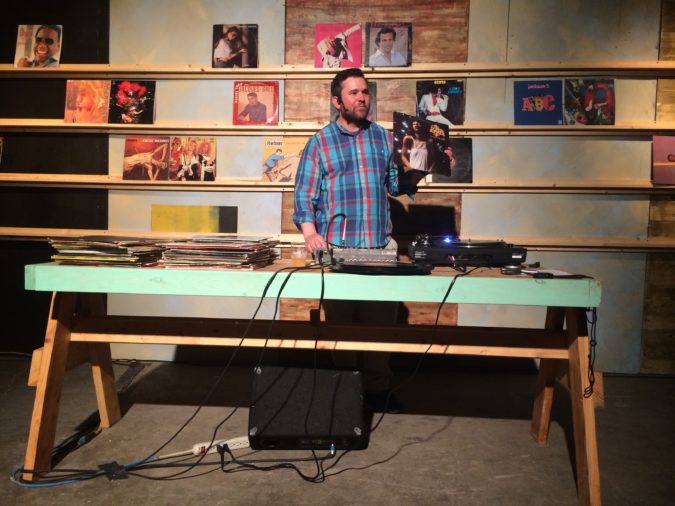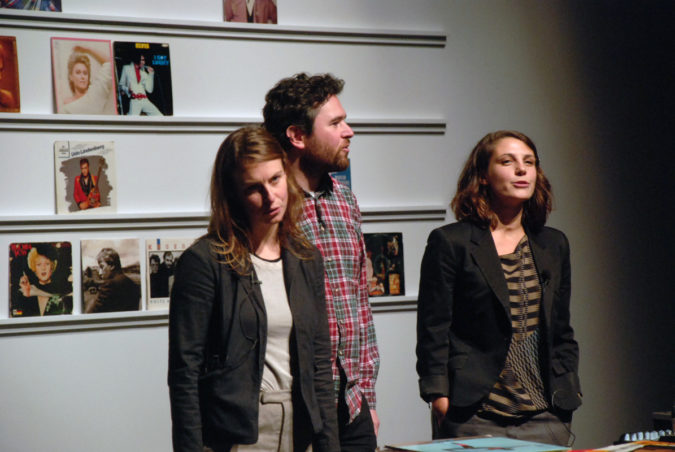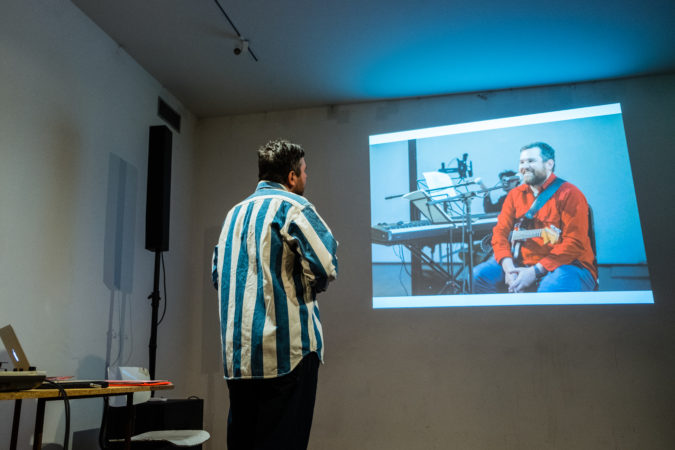PuShy Questions with Jacob Wren from The DJ Who Gave Too Much Information
January 24, 2020
Jacob Wren is a creator and performer of A User’s Guide to Authenticity is a Feeling, showing at The Western Front February 5-6, Click here for more information, and The DJ Who Gave Too Much Information, showing at The Western Front on February 7, Click here for tickets and more show information.
He’s also the creator of Bring Your Own Record/Listening Party, happening at Central Studios on February 8. Click here for more information.

1) What motivates your work as an artist?
There could be so many different ways to answer this question. However, at least one of these ways might be found in these three short passages from my book Authenticity is a Feeling: My Life in PME-ART:
“I went to the theatre and what I saw hinted at my desires but mainly felt like their frustrating opposite. If in conventional theatre you had costumes, characters, acting, scripted narrative, piped-in music, and artifice, instead I wanted people dressed in their normal clothing, being themselves, walking a tightrope between structure and spontaneity, music we loved played on vinyl, CDs, or with instruments, anything and everything that might bring us just a little bit closer to authenticity or reality. There was a kind of theatre that already existed and a kind of theatre that didn’t yet exist, might never exist, and I knew which side I was on.”
“There are no individual solutions to collective problems. Nonetheless, it is individuals who must come together and figure out what to do. In all of this, there is the unaddressed question of leadership. The anarchist in me genuinely believes rotating leadership is a solution: people take turns taking the lead in the areas of their greatest competence, interest, or desire. Another similar collaborative idea might be: best idea wins. But art is so subjective, and for five different people five different ideas might each seem best. It has always been my thinking that if someone in the group feels strongly that we should do something, then we should do it, their strong desire shouldn’t be watered or sanded down by the democratic entropy of the group. I want the projects to be open enough to welcome the strongest impulses of each of the participants. This is my ideal, and like all ideals it is something I often fall short of achieving. Perhaps this ideal is not even best for every collaborative situation. In a sense, it is just another way of saying that I want to work in ways that are deeply collaborative while at the same time keeping our most intense individual artistic differences more alive than alive.”
“Not as much now, but more when we first met, Sylvie Lachance (Co-artistic Director of PME-ART) would sometimes talk about the power of being the official opposition in theatre or in art. That the official opposition can sometimes do more to change things, both more to change the discourse and more to change concrete policies and actions, than those actually in power. The official opposition has the freedom to push as hard as they want, to act purely on principle, and by continually doing so they can keep things moving toward change.”

2) What does being part of PuSh 2020 represent for you?
Last year PME-ART celebrated our twentieth anniversary. And we have never performed in Vancouver. So it’s been something we’ve been wanting to do for over twenty years now. I thought maybe it was never going to happen but it seems I was wrong. So perhaps it represents the miracle of perseverance. Or just doing something you’ve always wanted to do but have never done.
3) Is there anything you want audiences to keep in mind while experiencing your show?
The audience should keep in mind anything and everything.
4) How might we see PuSh 2020 themes of subversion or vulnerability reflected in the work?
Subversion and vulnerability are really beautiful themes. I very much hope our work continues to fully embody them. And there is of course also another kind of vulnerability as we sometimes fall short of this goal.

5) What other PuSh show would you most like to see?
I’ve already seen Cuckoo, Cutlass Spring, Monday Nights and Gardens Speak and would highly recommend all four. I’d like to see as many as I can but a few that I’m especially curious about: Footnote Number 12, Free Admission, The Fever, Idealverein and KISMET, things have changed.
6) What qualities do you most admire in other artists?
All the artists I admire are such a strange combination of completely open and completely stubborn.
7) Any advice for emerging artists?
The only thing that works is persistence.

8) What do you do when you’re not working or making art?
Think about working and making art. And also think about how I really should have more things in my life outside of work and art.
9) What about Vancouver most entices you?
When I think about Vancouver perhaps the first thing I think about is Dan Bejar who, as you probably already know, makes music under the name Destroyer. And especially his 2004 song Don’t Become the Thing You Hated. Whenever I feel I’m veering artistically off course that song begins to play very gently in my subconscious and helps me take the necessary steps back toward something that feels a little bit more meaningful over time.
10) What is your biggest art-making wish or fantasy (if money were no object)?
I’m fascinated by historical art movements. I know how problematic they can be. But, nonetheless, I would like to start or be part of a global art movement that changes everything undeniably for the better. If that’s not possible I’ll simply continue trying to be an okay human being.
Click here for A User’s Guide to Authenticity is a Feeling
Click here for the DJ Who Gave Too Much Information
Click here for Bring Your Own Record/Listening Party
Jacob Wren’s practice has freely mixed literature, collaborative performance and visual art. His books have been published in English, French and Norwegian, among them Polyamorous Love Song was a finalist for the Fence Modern Prize in Prose and one of The Globe and Mail’s 100 best books of 2014. Rich and Poor was a finalist for the 2016 Quebec Writers’ Federation Paragraphe-Hugh MacLennan Prize for Fiction. Much of his performance work is made as co-artistic Director of Montreal-based interdisciplinary group PME-ART. He has also collaborated on projects with Nadia Ross (Sto Union), Lene Berg, Tori Kudo, and Pieter de Buysser, in Canada and abroad. He frequently writes about contemporary art.